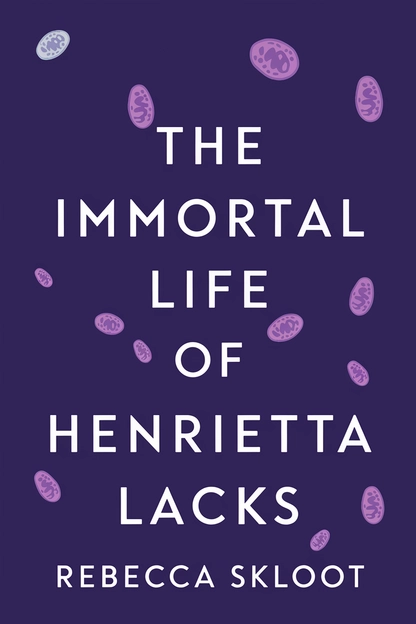
The Immortal Life of Henrietta Lacks
by Rebecca Skloot
Brief overview
This book unravels the hidden story of Henrietta Lacks, an African American woman whose cells revolutionized science. By following Henrietta and her family through intense challenges, it reveals the intersection of race, medicine, and ethics. Readers will discover how one individual’s legacy still resonates in laboratories worldwide.
Introduction
Imagine learning that part of your loved one lives on in laboratories—and that it’s transformed science forever. That’s what happened to the Lacks family, who discovered, decades too late, that cells from Henrietta Lacks had become the first “immortal” human cells grown in culture. This startling truth propelled them—and eventually the world—into new ethical territory.
Henrietta was an everyday person in many ways: a mother of five, a devoted friend, someone whose life included both joys and pains. Yet, without her ever realizing it, she contributed more to modern medicine than most researchers do in an entire career. Her story also reveals how complex issues like race, class, and consent converge in medical research, influencing how science is done.
In these pages, we’ll meet her family, learn how her cells—known as HeLa—gave rise to medical breakthroughs, and explore the social and legal debates surrounding them. Above all, we’ll see why honoring the real human being behind these cells matters, both for science and for society.
Henrietta’s Early Life
Henrietta grew up in the small town of Clover, Virginia, in a community largely shaped by the remnants of slavery and systemic segregation. She lost her mother when she was very young, and much of her childhood was spent on her family’s tobacco plantation land. Life in Clover was tough, with large families working in the fields, bound both by hardships and a deep sense of kinship.
Eventually, Henrietta moved to Baltimore in search of better opportunities. She and her husband, David (or “Day”), settled in Turner Station, a part of the city where many Black families strove for decent jobs at steel mills and lived tightly knit lives. Even amid economic struggles, Henrietta was known for her warm personality and the homemade meals that brought people together.
Yet the shadows of poverty and limited access to quality healthcare persisted. In those days, Black patients often visited segregated wards in hospitals like Johns Hopkins, grateful for treatment but wary of rumors about experimentation on the poor. Even so, Henrietta’s family mainly focused on everyday life—raising children and seeking a modest slice of security.
What is The Immortal Life of Henrietta Lacks about?
The Immortal Life of Henrietta Lacks by Rebecca Skloot examines how one woman’s unwitting contribution changed the face of medical science. It reveals the compelling story of Henrietta Lacks, whose “HeLa” cells led to breakthroughs in cancer research, vaccine development, and beyond. Yet this book is about more than just cells—it’s a journey into issues of race, class, and ethics that continue to influence modern medicine.
By following Henrietta’s personal history and her family’s struggles, the author sheds light on the lingering questions about consent and identity in research. Readers come away understanding the deep human impact behind scientific discovery and how one person’s life can shape society’s pursuit of knowledge.
Review of The Immortal Life of Henrietta Lacks
One of this book’s foremost strengths is its balance of scientific exploration and human narrative. Skloot delves into the science behind HeLa cells—such as their role in developing polio vaccines—while honoring Henrietta’s legacy and the emotional toll on her family. The result is a story that ties medical achievements to real-world effects.
Readers will find practical takeaways about patient rights, informed consent, and the ways race and socioeconomics affect healthcare. The writing style is clear yet detailed, making the science accessible for those without a strong background in medicine. At the same time, it offers enough depth to engage medical professionals and ethicists.
For anyone curious about medical ethics or social justice, this book remains highly relevant. It’s a testament to the importance of respecting patients’ autonomy and ensuring their stories are heard. Ultimately, The Immortal Life of Henrietta Lacks is a vital read that I strongly recommend for its thorough, compassionate look at a woman whose influence endures.
Who should read The Immortal Life of Henrietta Lacks?
- Healthcare workers seeking deeper insight into the ethics behind cell research.
- Bioethics students and professors examining real-world consent dilemmas.
- General readers interested in a true story that blends science and personal drama.
- Historians or sociologists studying race, healthcare access, and informed consent.
About the author
Book summaries like The Immortal Life of Henrietta Lacks
Why readers love Mindleap
10-Minute Book Insights
Get the core ideas from the world's best books in just 10 minutes of reading or listening.
Curated For You
Discover your next favorite book with personalized recommendations based on your interests.
AI Book ExpertNew
Chat with our AI to help find the best book for you and your goals.
Reviews of MindLeap
Love how I can get the key ideas from books in just 15 minutes! Perfect for my busy schedule and helps me decide which books to read in full.
Alex R.
The summaries are incredibly well-written and the audio feature is perfect for my commute. Such a time-saver!
Jessica M.
Great app for personal growth. The insights are clear and actionable, and I love how they capture the essence of each book.
Chris P.
The app is beautifully designed and the summaries are top-notch. Definitely worth every penny!
Sarah K.




